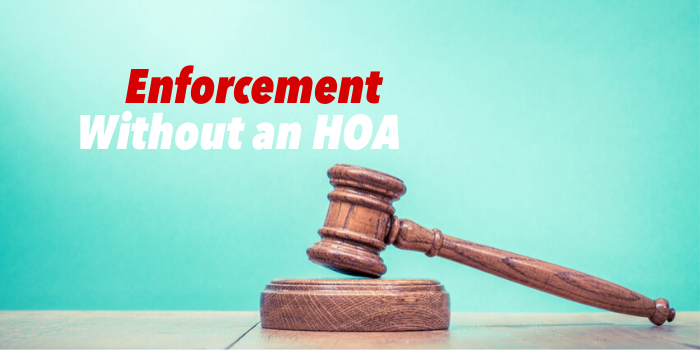Some homeowners may be under the impression that they do not have to abide by any covenants or restrictions if there is no HOA functioning within their community, whether the association was phased out recently, or it hasn’t been functional for decades. Unfortunately, those people may need to think again. Civil Code often allows homeowners the right to enforce their community’s CC&Rs against their neighbors, even in the absence of a functioning HOA.
In many states, it is possible for individual homeowners to enforce CC&Rs if the HOA is unable or unwilling to do so. Since an HOA is defined as an area where all members have a vested interest in the community, one member can claim responsibility for enforcing any rule of which their neighbor is in violation.
Of course, there are exceptions, and enforcement varies from state-to-state. Some states rule that the enforcement of covenants and restrictions essentially ‘dies’ with the HOA if it ceases to function. In other states, once the CC&Rs are recorded with the state, they become deeded with the property and are enforceable, even when there is no longer an association board in place to manage them. If the CC&Rs are deeded, any individual homeowner technically has legal standing to ensure that the others comply.
It would be wise to first have a friendly conversation with the offending party to see if a resolution can be found that would satisfy both homeowners. This option is in everyone’s best interest – it doesn’t cost anything, it can be a relatively quick process, and relationships likely will not suffer.
If a satisfactory resolution cannot be found, the individual homeowner would have to bring a personal lawsuit against the offending homeowner. All correspondence between parties regarding the rule infraction should, if possible, be recorded in order to be presented in court. The offending homeowner, if found guilty, could be responsible for resolving the issue and for paying all attorney fees and court costs. This could be a costly and drawn out process and has the potential to significantly damage relationships.
It is necessary to mention that sometimes the CC&Rs contain provisions that limit the right of residents to enforce the rules without a functioning HOA board. If a problem arises that cannot be solved between homeowners, both parties should consult the property deed, the CC&Rs, and meet with a legal advisor to ensure that they proceed down the correct path.
If the HOA, for whatever reason, ceases to function, homeowners can choose to band together and get a notarized document stating intent to amend or revoke the CC&Rs and file it with the state. This could make the CC&Rs unenforceable without a functioning HOA. Any community wishing to do this will want to employ legal assistance to ensure that everything holds up officially.







